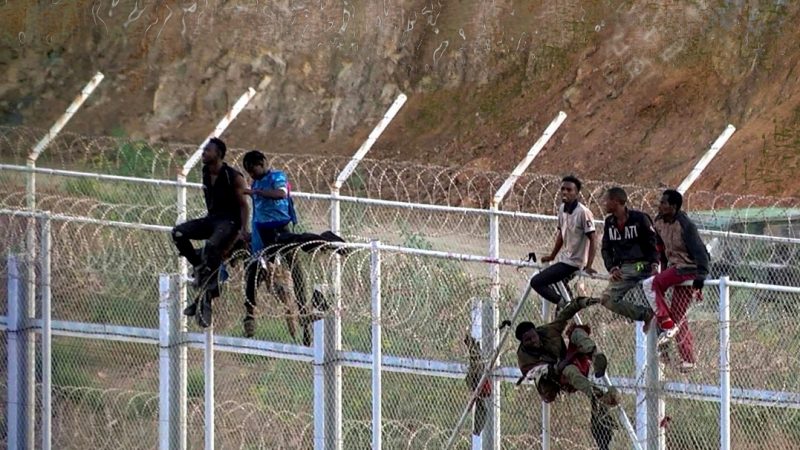Security, along with freedom, are the two things that are most sought after when it comes to settling down in a country. Economic data such as GDP per capita, standard of living, purchasing power, the precise numeral of the human development index matter, but safety and security are of utmost importance. Spain is one of the countries that is managing its borders the worst, especially in the south. The truth is that there are problems surrounding illegal migration in Spain have not because of the ineptitude of the police or the Spanish military, but because of the Spanish government.
What has happened to the Spanish borders? Well in short since incumbent Prime Minister of Spain Pedro Sánchez has been in power more than 200,000 illegals have entered the country. In order to illustrate the situation I shall cite an interview I have conducted with Samuel Vázquez. He is a policeman, criminologist and author of several books. The latest is titled ‘Don’t Fuck The Police’, where he tells how the police system is inadequate for the new type of crime that has its origins in illegal migration.
Vázquez first explains that this is not just a Spanish problem, but a European phenomenon.
“The processes of overflowing illegal immigration have always coincided in Europe in space and time with an increase in violent crime wherever they have occurred ”, says Vázquez.
An obvious question is, why did this phenomenon came to Spain with a delay. “If in Spain this impact has arrived later, it is because our first wave came from Latin America, our brothers with whom we share everything, and who have only had an influence on another item that has not been managed in the rest of Europe either: the adaptation processes of the second and third generation immigrants. Any social problem overflowing in space and time causes a failure in the freedom and security of any territory in a very short time; uncontrolled immigration as well”, explains Vázquez.
Hispanic-American immigrants being the first wave, what consequences did African immigration bring? “Quantitatively relevant illegal immigration provokes changes in the positive social dynamics (music, gastronomy) and in the negative ones as well (crime). When these processes come from a continent with which we share nothing (language, culture, religion, role of women in society, daily use of violence, etc.), they not only provoke changes, but also conflicts, namely a culture shock”, affirms Vázquez.
“When these processes characterize masses coming from areas with which we share nothing, and the influx is not barely quantitatively relevant, but overflowing, there is not only shock. Instead, social dynamics of the host country are annulled and others of the country of origin are imposed. There are places where traditional Western agents of authority, police and judges, no longer have authority, because it had been passed on to new agents: Mafia, criminal groups or religious leaders”, states Vázquez.
What two elements would you say have changed crime not only in Spain, but in the rest of Europe? “Origin and culture are the two basic items to understand the new criminal reality in Europe, in the same way that economic capacity and social class were decades ago. It is neither a question of nationality, as that is only a role and a conscious choice. For example, the footballer who eliminated Spain from the World Cup was born in Getafe, but he plays for Morocco because his origin and culture are from there, and that is where he feels home. He may be grateful to Spain, but he does not feel Spanish. Nor is it a question of race, but of origin and culture”, claimed Vazquez.
Vázquez ends his explanation with how the illegal immigration element and the two others explained have changed crime in Europe.
“Overflowing illegal immigration joins two other phenomena in the processes of destruction of European societies from a criminal perspective: second and third generation dynamics and technification of native crime. Neither our police model nor our criminal policy is designed to face this new criminal reality.”
Another major problem that has caused illegal immigration in Europe in the last decade has been the so-called no-go zones, which Vázquez mentioned earlier. No-Go zones are territorial delimitations, usually on the outskirts of large cities where the police are not an authority, they cannot even enter. These areas are governed by their own rules, the rules the host country has no power over.
In Spain, fortunately, we still do not have this problem, so I asked Vázquez if he thinks that in the long term this could also happen in our country. “Not in the long run, but in the short term. It has been proven that if the police model and criminal policy are not changed quickly, neighborhoods will be lost and cities will become empty in a few years.”
Here we are facing the same problems as Sweden and France did 20 years ago, and our politicians are responding with the same strategies: denial of the problem, statistical manipulation and prohibition of analysis for fear of the political cost of being called racist, for example.”
“We accept acculturation processes that have always failed elsewhere, where all cultures are worth the same. Wrong. When we tell them that it is enough for them to respect our customs ‘even if they do not share them’ we invite them to keep theirs, and once they are strong in a neighborhood, something appears that not only does not share them, but does not respect them either: the no-go zone”.
“No-go zones come from failed states where violence is a basic method to settle conflicts. We come from Roman law, they are two irreconcilable worlds. If these immigrants accept European values and laws and are willing to improve the country together with us, that is fine. But we cannot accept that they come to impose their failed states in ours”, concludes Vázquez.








[…] Is there one faith and one single way of following it? Are clashes, like the tension and violence experienced in Spain, inevitable? Are Muslim communities more prone to authoritative […]
[…] When did you see the issue of illegal immigration become a serious problem in Spain? […]